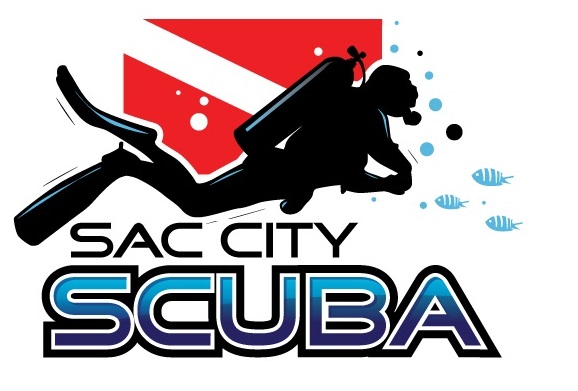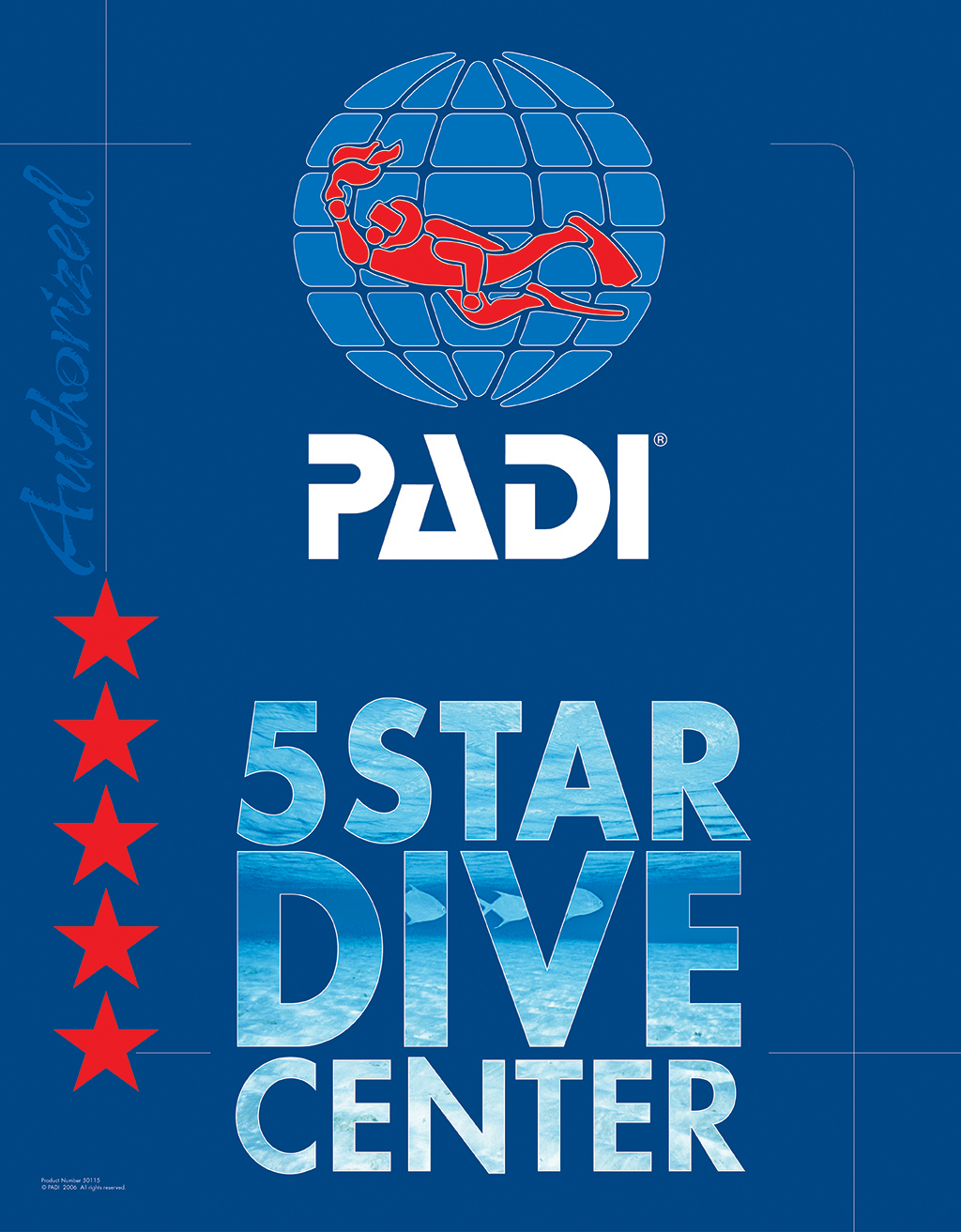Specialty Courses | click links for more detail
PADI Deep Diver
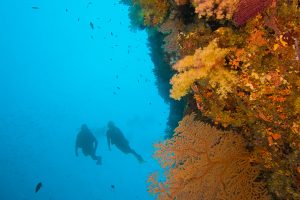
Your training starts by reviewing reasons for deep diving and how important it is to know your personal limits. During four deep dives with your instructor, you'll go over:
- Specialized deep diving equipment.
- Deep dive planning, buddy contact procedures and buoyancy control.
- Managing your gas supply, dealing with gas narcosis and safety considerations.
You may be able to get college credit for the Deep Diver course – ask your instructor.
Also, the first dive of this PADI Specialty Diver course may credit as an Adventure Dive toward your Advanced Open Water Diver certification – ask your instructor about earning credit.
Sign Up for Deep DiverDigital Underwater Photography
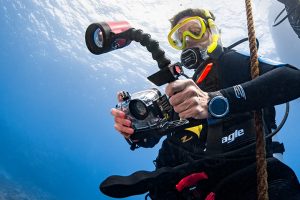
Through hands-on training during two scuba dives and guidance from your PADI Professional, you'll discover:
- How to choose the right underwater camera system for you.
- The PADI SEA (Shoot, Examine, Adjust) method for getting great shots quickly.
- Principles for good composition of underwater images.
- Practical techniques to take great photos with your digital camera.
Get credit! The second dive of this PADI Specialty Diver course may credit as an Adventure Dive toward your Advanced Open Water Diver certification – ask your instructor about earning credit.
Night Diver
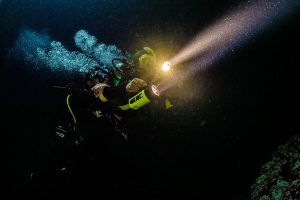
Scuba diving at night teaches you to focus on what you can see in your light's beam, on controlling your buoyancy by feel, on staying with your buddy and on paying attention to details you may overlook during the day. During three night dives, you'll practice:
- Light handling and communication techniques.
- Entering, exiting and navigating in the dark.
- Identifying how plants and animals differ or change behavior at night.
You may be able to get college credit for the Night Diver course – ask your instructor.
Also, the first dive of this PADI Specialty Diver course may credit as an Adventure Dive toward your Advanced Open Water Diver certification – ask your instructor about earning credit.
Peak Performance Buoyancy
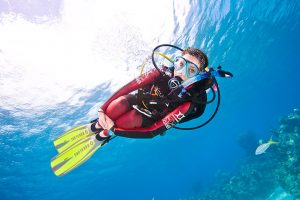
During two scuba dives, you'll learn how to:
- Determine the exact weight you need, so you're not too light or too heavy.
- Trim your weight system and scuba gear so you're perfectly balanced in the water.
- Streamline to save energy, use air more efficiently and move more smoothly through the water.
- Hover effortlessly in any position – vertical or horizontal.
Get credit! The first dive of this PADI Specialty Diver course may credit as an Adventure Dive toward your Advanced Open Water Diver certification – ask your instructor about earning credit.
Sign Up for BuoyancySearch & Recovery
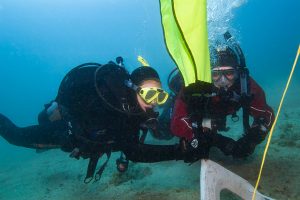
Gathering information and resources, then carefully planning a search are the first important steps you learn. During four scuba dives you'll practice:
- Swimming search patterns using your compass and natural navigation.
- Locating large and small objects using various search patterns.
- Using a lift bag for large or heavy objects, plus other recovery methods.
- Planning a search operation based on facts gathered about a lost object prior to the dive.
You may be able to get college credit for the Search and Recovery course – ask your instructor.
Also, the first dive of this PADI Specialty Diver course may credit as an Adventure Dive toward your Advanced Open Water Diver certification – ask your instructor about earning credit.
Sign Up for Search & RecoveryUnderwater Navigator
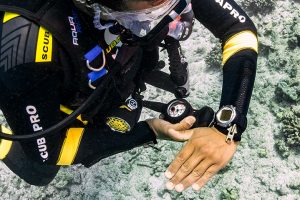
You'll learn the tools of the trade, including navigation using natural clues and by following compass headings. During three scuba dives, you'll practice:
- Methods to estimate distance underwater.
- Compass navigation while making at least five turns.
- Marking or relocating a submerged object or position from the surface.
- Underwater map making.
You may be able to get college credit for the Underwater Navigator course – ask your instructor.
Also, the first dive of this PADI Specialty Diver course may credit as an Adventure Dive toward your Advanced Open Water Diver certification – ask your instructor about earning credit.
Sign Up for NavigationUnderwater Videographer

Your Instructor will explain how to select, maintain and care for your underwater video equipment, whether it's a housed unit with external lights, or your underwater camera that also shoots video. You'll cover fundamentals such as exposure, focus, story line and sequencing. Post dive, you'll learn about the editing process and how to produce a video that truly captures your scuba adventures.
Get credit! The first dive of this PADI Specialty Diver course may credit as an Adventure Dive toward your Advanced Open Water Diver certification – ask your instructor about earning credit.
Sign Up for VideoWreck Diver
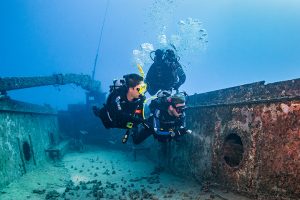
There are many different types of wrecks, some of which are protected by laws that guard their historical and cultural significance. Your training starts by reviewing guidelines for researching and respecting wrecks. During four dives you'll learn:
- Safety considerations for navigating and exploring wrecks.
- Surveying and mapping a wreck.
- Using penetration lines and reels to guide exploration.
- Techniques to avoid kicking up silt or disturbing the wreck and its inhabitants.
You may be able to get college credit for the Wreck Diver course – ask your instructor.
Also, the first dive of this PADI Specialty Diver course may credit as an Adventure Dive toward your Advanced Open Water Diver certification – ask your instructor about earning credit.
Sign Up for WreckMaster Scuba Diver
Join the best of the best in recreational scuba diving and live the dive life as a PADI Master Scuba Diver. The Master Scuba Diver rating places you in an elite group of respected divers who have earned this rating through both significant experience and scuba training. Fewer than two percent of divers ever achieve this rating. When you flash your Master Scuba Diver card, people know that you've spent time underwater in a variety of environments and had your share of dive adventures.
Every diver, who is at least 12 years old, should aim for Master Scuba Diver.
The path starts with earning a PADI Open Water Diver certification, followed by PADI Advanced Open Water Diver and PADI Rescue Diver (or qualifying certifications). You also need to earn five PADI Specialty Diver certifications and have logged a minimum of 50 dives.
